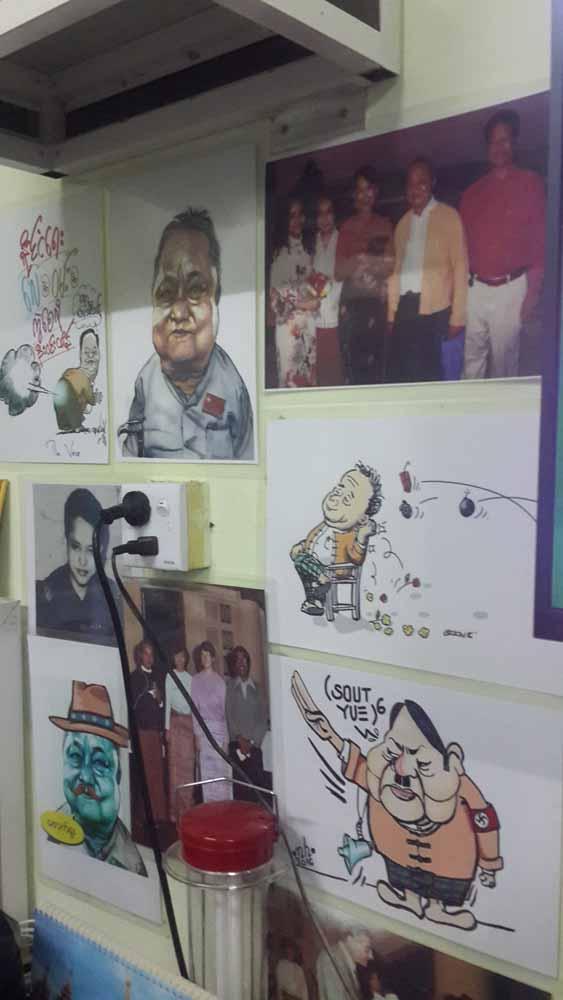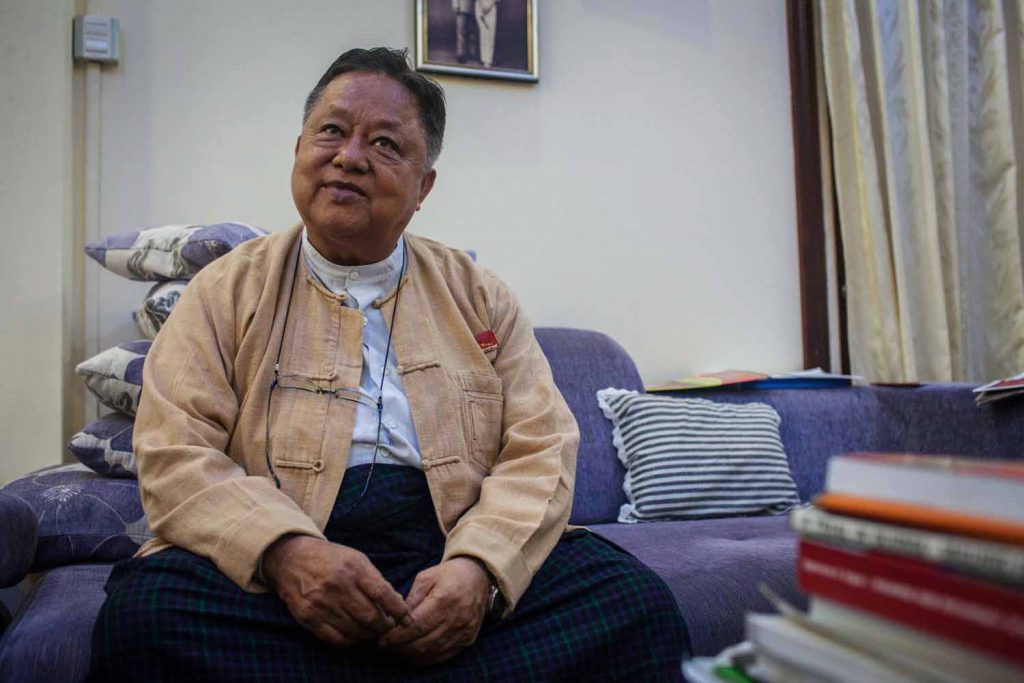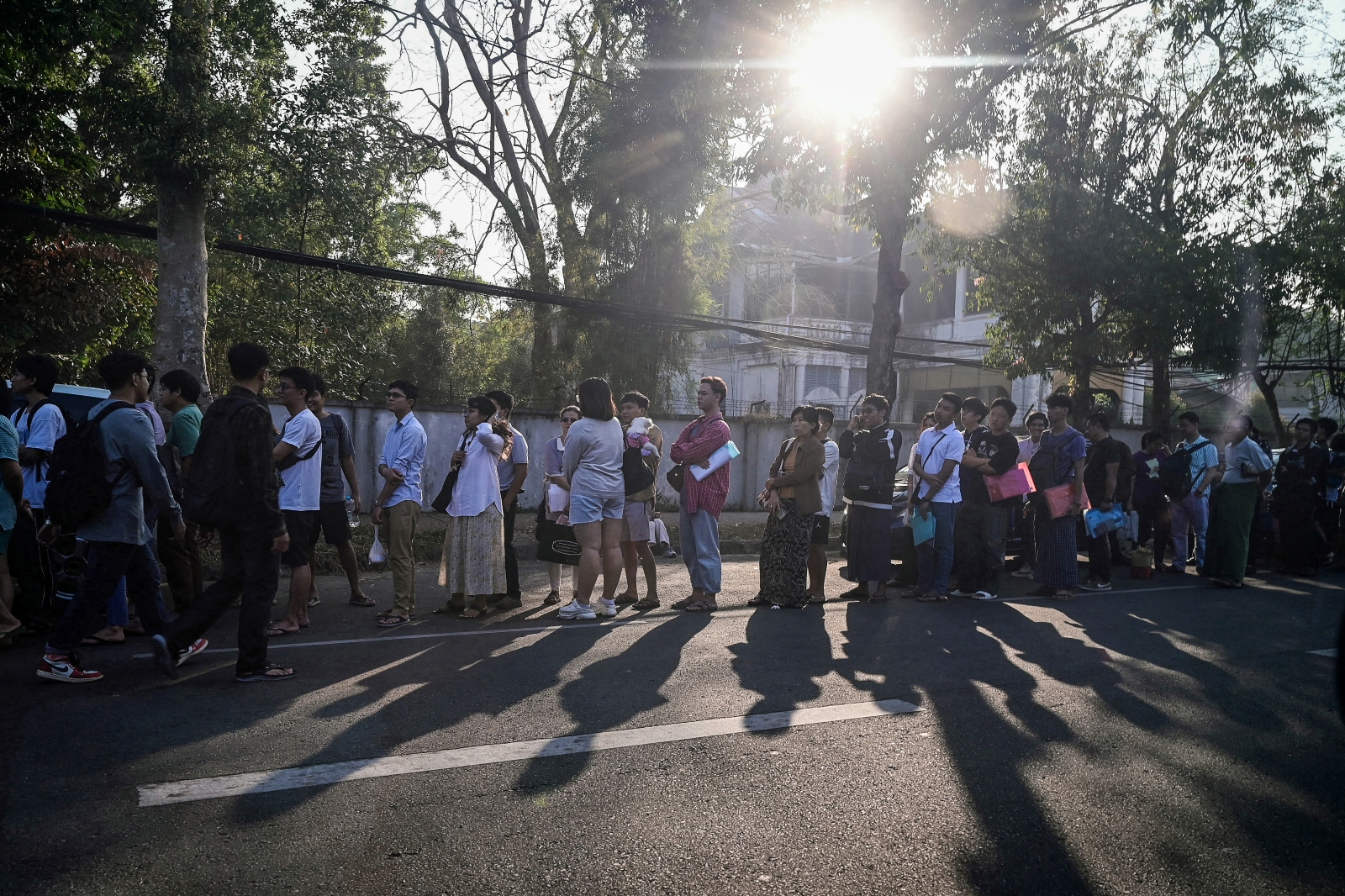Blunt views and a sharp tongue have helped to make NLD spokesperson U Win Htein one of the most controversial members of the ruling party but criticism of the former military officer, businessman and political prisoner is like water off a duck’s back.
By NYAN HLAING LYNN | FRONTIER
AN ELDERLY man’s chuckles could be heard over the sound of the television from a room at the municipal guesthouse in Nay Pyi Taw, the home away from home for members of the Pyidaungsu Hluttaw, also known as the Union Parliament.
The outspoken and sometimes controversial U Win Htein, 76, a veteran member of the National League for Democracy and its official spokesperson, was laughing at the collection of cartoons decorating the walls, most of which were poking fun at him.
“I’ve stuck these cartoons on the wall because I am proud of them,” he told Frontier. “The cartoonists are drawing pictures of me because they care about me,” he said.
Often in the headlines, especially since the change of government, the NLD central executive committee member and long-time confidante of Daw Aung San Suu Kyi has attracted criticism for his blunt manner, frank speech and pithy expressions.
From the DSA to Insein
A member of the NLD since it was formed in 1988 and its Pyithu Hluttaw representative for Meiktila from 2012 until 2016, the former political prisoner had initially pursued a career in the Tatmadaw, which he joined in 1959.
In 1963, he graduated in Batch Number 5 from the Defence Services Academy, where he won several military awards, as a cadet captain.
He spent five years with an infantry battalion, participating in counterinsurgency operations, including against the Communist Party of Burma, before being transferred to the Ministry of Defence.
He left the military in 1977, after testifying at the trial of Captain Ohn Kyaw Myint, who was hanged that year over an alleged plot to assassinate junta chief, General Ne Win. The plot was uncovered in 1976 and Win Htein was accused of being aware of it, but not reporting it.
At the Defence Ministry, Win Htein had become close with then Commander-in-Chief, General Tin Oo, who had been forced to retire from the Tatmadaw in 1976 and later charged with treason in connection with the coup plot.
Win Htein caused much amusement when he testified during the coup trial, according to Tin Oo.
“They thought he must have known everything about the plot, but Win Htein answered their questions by laughing and saying he didn’t know,” said Tin Oo, according to an extract in the book The former Commander-in-chief who the people admired, about Tin Oo and written by journalist Pho Sai.
Win Htein said the judge and those making accusations against him were his friends, so he teased them during the trial.
“When the judge asked what unit I was serving in, I replied, ‘Why are you asking? You already know,’” Win Htein said.
He published a book about the plot in October last year, titled The subject I want to write about, the subject I want to tell about: Captain Ohn Kyaw Myint and the State Assassination in which he explained why he was suspected of knowing about the coup plot before it was uncovered.
Win Htein wrote that before the trial he had inspected the palms of Capt. Ohn Kyaw Myint to try and find out the outcome.
“I said to Ohn Kyaw Myint, ‘Hey guy, show me your palms’ while I walked near him at the end of the trial, trying to play a joke. But I was not able to read [the palms] because intelligence officers shouted at me not to be familiar with a defendant,” he said.
However, intelligence officials who witnessed the exchange told their seniors that Win Htein was giving encouragement to Capt. Ohn Kyaw Myint, he told Frontier.
The irrepressible Win Htein didn’t let his discharge from the military slow him down. He instead launched a successful import/export business.
“Under the rule of the Burmese Socialist Programme Party, it was very difficult to run a business. I didn’t dare buy a saloon car because if you had one or built a brick house, U Ne Win’s intelligence officials would take you to a secret place and ask you many questions. Many people were arrested for this,” Win Htein said.
After the national uprising was crushed in 1988, he was asked by his former commander-in-chief, Tin Oo, a co-founder of the NLD, to join the party. He was assigned to Aung San Suu Kyi’s personal staff.

Cartoons making fun of U Win Htein line the wall at the municipal guesthouse in Nay Pyi Taw. (Nyan Hlaing Lynn / Frontier)
The crackdown launched by the junta after the NLD’s triumph in the 1990 election marked the start of prison terms for many party members. But Win Htein, like Aung San Suu Kyi, had already been detained long before the election victory. He was jailed from 1989 to 1995, and from 1996 to 2008, when he was released and re-arrested within 24 hours and sent back to prison until 2010.
In March 2012 he won the Pyithu Hluttaw seat in his hometown of Meiktila. A year later, the Mandalay Region town was convulsed by communal violence that left dozens dead and thousands homeless, many of them Muslims.
He was in Meiktila at the time and said he pleaded with Mandalay Region Chief Minister U Ye Myint to order the police to control Buddhist mobs. He later described seeing Muslim children killed in front of his eyes, and accused the security forces of standing by and doing nothing.
“I am ashamed to be from Meiktila,” he said later, referring to the killings and arson, a comment that prompted an unsuccessful move by some of his constituents to seek his removal from the Union Parliament.
Win Htein suffers from numerous health issues, including heart problems and hypertension, and now sleeps with an oxygen mask.
He did not re-contest the seat last year and has since served the NLD as its official spokesperson, a role in which he has cemented a reputation for being outspoken and using blunt language.
“They came automatically; I can’t help it,” he said of his brusque comments on a range of issues.
Many journalists have felt the sting of Win Htein’s retorts.
In an interview with Frontier before the 2015 election, he dismissed the reporter’s question about the NLD’s ability to govern as “stupid” – following it up with his distinctive mischievous chuckle – and in early 2016 scolded a Radio Free Asia journalist for asking about the NLD’s preparations to form a government. In August, he called Ludu Pone Yeik (People’s Image) reporter, Ko Sai Wunna, “soutyuu soutyuu” (a useless fool), for asking if the government was planning a reshuffle.
Sai Wunna later complained that a person with political power and a high-profile position such as Win Htein should not resort to verbal abuse.
“I felt that he acted as if he would have power forever, but U Win Htein said he had no problem with his behaviour,” the reporter said.
The disciplinarian
Win Htein’s role in NLD disciplinary cases has resulted in his being regarded as the party’s hatchet man. The most high profile cases involved Dr Tun Win, the Deputy Minister for Agriculture, Livestock and Irrigation, and four senior members of the party’s Shan State branch.
In early September, Win Htein travelled to the Shan State capital, Taunggyi, and demoted several senior NLD members for failing to properly support the party’s candidate’s in the previous year’s election. He then summarily dismissed another member after he criticised the purge on Facebook. Win Htein said at the time he was acting at Aung San Suu Kyi’s behest, despite the state counsellor being barred from “party activities” under the constitution due to her role in the government.
But after convening a tribunal to hear the appeals, the party central executive committee eventually upheld the demotion of the chair of its Shan State branch, Daw Khin Moe Moe, and the head of its Taunggyi District branch, U Tin Maung Toe. Two other suspended members were reinstated.
The demoted members appealed that due process had not been followed, with Khin Moe Moe describing Win Htein as having behaved “like a dictator”.
The dismissal of Tun Win in November stemmed from sharp disagreements between the respected agronomist and the Minister for Agriculture, Livestock and Irrigation, Dr Aung Thu. When their differences became irreconcilable, Win Htein asked Tun Win to step aside and instead take a position on the Nay Pyi Taw Council. The deputy minister refused the offer several times, after which he was fired by President U Htin Kyaw.
Tun Win condemned the circumstances of his dismissal, saying it was due to “one-sided voices”. The incident also prompted accusations that Win Htein had violated constitutional provisions that restrict the involvement of political parties in government affairs, and vice versa.
In response to this accusation, Win Htein wrote an article published in The Voice daily on November 30. The article said that since the party makes decisions on forming the government, it is not only involved in government but actually takes the lead in it.
In effect, he said that the NLD is not following the constitution – and it doesn’t need to.
Party politics
Since the 2015 election and transition, Win Htein’s importance and power within the NLD has grown. He has effectively replaced Aung San Suu Kyi as party leader on a day-to-day basis, but also moved closer to her as others have fallen out of favour.
This has created tension with some other senior members within the party, who believe that he is monopolising power within the party.
An NLD central executive committee, who spoke to Frontier on the condition of anonymity, said that in the case of firing the party officials in Shan State, the decision initially appeared to be Win Htein’s personal decision, but was later backed by the party.
“Of the most senior officials of the party, he is the only one in Nay Pyi Taw who is managing [party members], so he has more power,” said the NLD official.
Despite the controversies, many senior political figures speak highly of the veteran.
U Min Thu, chairman of the NLD’s Nay Pyi Taw office, called Win Htein the “godfather” of the party who he said is leading it down the right track in Aung San Suu Kyi’s absence from party affairs.
“He is the only person who can bring together the party, the government and the hluttaws with one another,” said Min Thu.
Daw Tin Tin Yi, Pyithu Hluttaw MP for the NLD in Kyunsu Township, Tanintharyi Region, said Win Htein tends to speak quickly and bluntly, but that he is a kind-hearted person.
“Strangers might think that he is not careful with his language, but we can see that he is good natured because we know him. Other people might not understand him, but he is carrying out things on behalf of Aung San Suu Kyi for the party, [and is willing] to be disliked,” she said.
Renowned comedian Zarganar (real name Ko Thura), was incarcerated alongside Win Htein inside Insein Prison between 1990 and 1994 and said he had fond memories of the politician, who always found time for his fellow inmates.
“Some say that he’s authoritarian, but to the best of my knowledge he is not like that. He is quite a harmonious person. The way he talks has become a habitual action for him. If a problem took place in prison, he reacted in a gentlemanly manner.”
Zarganar added that even though Win Htein was a political prisoner sleeping on the floor, he had no concerns criticising senior officials, director generals or minister when they came to visit.
“In the transitional period like this, as a leader of the party, he is not the kind of person who tries to degrade other people,” he said.
Asked about being outspoken, Win Htein cited Min Thein Kha, a famous writer and astrologer, who said: “Some people like to freely give their opinions without being asked for them”.
“Now, people are doing just that. Never mind. They will stop when they get tired.”
Top photo: NLD veteran U Win Htein has taken full control of the party since the change of government in late March last year. (Lauren DeCicca / Frontier)







